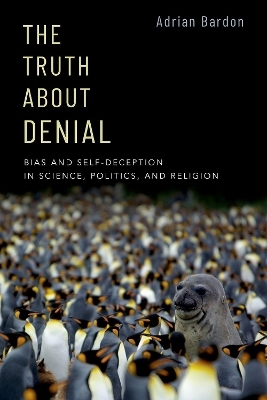
The Truth About Denial
Bias and Self-Deception in Science, Politics, and Religion
Seiten
2019
Oxford University Press Inc (Verlag)
978-0-19-006227-9 (ISBN)
Oxford University Press Inc (Verlag)
978-0-19-006227-9 (ISBN)
This volume is a wide-ranging examination of denial and ideological denialism. It offers a readable overview of the psychology and social science of bias, self-deception, and denial, and examines the role of ideological denialism in conflicts over science and public policy, politics, and culture.
This is an open access title available under the terms of a CC BY-NC-ND 4.0 International license. It is free to read at Oxford Scholarship Online and offered as a free PDF download from OUP and selected open access locations.
People believe what they want to believe. It is a striking-yet all too familiar-fact about human beings that our belief-forming processes can be so distorted by fears, desires, and prejudices that an otherwise sensible person may sincerely uphold a false claim about the world despite overwhelming evidence to the contrary. When we describe someone as being "in denial," we mean that he or she is personally threatened by some set of facts and consequently fails to assess the situation properly according to the evidence, instead arguing and interpreting evidence in light of a pre-established conclusion.
In a world polarized over politics, culture, race, and religion, it is evident that ideological commitments can influence one's perception of reality in socially destructive ways, especially when one perceives a threat to these commitments. When group interests, creeds, or dogmas are threatened by unwelcome factual information, biased thinking can become ideological denialism. This is a problem that affects everybody: Whereas denial can interfere with individual well-being, ideological denialism can stand in the way of urgent advancements in public policy.
This book offers an accessible, historically and scientifically informed overview of our understanding of denial and denialism. Adrian Bardon introduces the reader to the latest developments in the interdisciplinary study of denial, and then investigates the role of human psychology and ideology in, respectively, science denial, economic policy, and religious belief.
This is an open access title available under the terms of a CC BY-NC-ND 4.0 International license. It is free to read at Oxford Scholarship Online and offered as a free PDF download from OUP and selected open access locations.
People believe what they want to believe. It is a striking-yet all too familiar-fact about human beings that our belief-forming processes can be so distorted by fears, desires, and prejudices that an otherwise sensible person may sincerely uphold a false claim about the world despite overwhelming evidence to the contrary. When we describe someone as being "in denial," we mean that he or she is personally threatened by some set of facts and consequently fails to assess the situation properly according to the evidence, instead arguing and interpreting evidence in light of a pre-established conclusion.
In a world polarized over politics, culture, race, and religion, it is evident that ideological commitments can influence one's perception of reality in socially destructive ways, especially when one perceives a threat to these commitments. When group interests, creeds, or dogmas are threatened by unwelcome factual information, biased thinking can become ideological denialism. This is a problem that affects everybody: Whereas denial can interfere with individual well-being, ideological denialism can stand in the way of urgent advancements in public policy.
This book offers an accessible, historically and scientifically informed overview of our understanding of denial and denialism. Adrian Bardon introduces the reader to the latest developments in the interdisciplinary study of denial, and then investigates the role of human psychology and ideology in, respectively, science denial, economic policy, and religious belief.
Dr. Adrian Bardon is a professor of philosophy at Wake Forest University, where he teaches courses on political philosophy, philosophy of religion, philosophy of space and time, and the history of philosophy. He is the author of A Brief History of the Philosophy of Time (OUP 2013), as well as numerous scholarly articles on time, perception, politics, the history of philosophy, and various other subjects.
| Erscheinungsdatum | 22.09.2019 |
|---|---|
| Verlagsort | New York |
| Sprache | englisch |
| Maße | 206 x 140 mm |
| Gewicht | 408 g |
| Themenwelt | Geisteswissenschaften ► Philosophie ► Allgemeines / Lexika |
| Geisteswissenschaften ► Philosophie ► Erkenntnistheorie / Wissenschaftstheorie | |
| Geisteswissenschaften ► Philosophie ► Ethik | |
| ISBN-10 | 0-19-006227-4 / 0190062274 |
| ISBN-13 | 978-0-19-006227-9 / 9780190062279 |
| Zustand | Neuware |
| Haben Sie eine Frage zum Produkt? |
Mehr entdecken
aus dem Bereich
aus dem Bereich
die letzten Jahre der Philosophie und der Beginn einer neuen …
Buch | Hardcover (2024)
Klett-Cotta (Verlag)
CHF 39,20
Gesundheitsschutz, Selbstbestimmungsrechte, Rechtspolitik
Buch | Softcover (2024)
Kohlhammer (Verlag)
CHF 54,60
Jenseits von Identität | Ausgezeichnet mit dem Leipziger Buchpreis …
Buch | Softcover (2023)
Ullstein Taschenbuch Verlag
CHF 19,55


